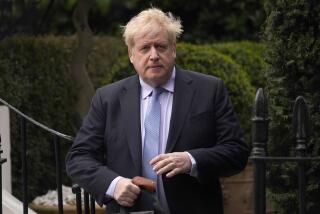Blair Criticized on Claims of Iraqi Weapons
- Share via
LONDON -- A high-level parliamentary committee admonished the British government Monday for its handling of intelligence information on Iraq, saying Prime Minister Tony Blair used language that was sometimes “more assertive than that traditionally used in intelligence documents” to describe the threat posed by Saddam Hussein’s alleged arsenal of illegal weapons.
And it said one of the government’s key claims in the run-up to the war -- that Iraq could deploy chemical and biological weapons in as little as 45 minutes -- came from a single, uncorroborated source. As such, the panel said, it should not have played such a prominent role in a dossier of intelligence evidence released in September.
But the House of Commons Foreign Affairs Committee also concluded that the government did not willfully mislead Parliament over what it knew about Iraq’s weapons programs.
The committee made its report after a four-week inquiry into whether the government embellished evidence against Iraq to swing public opinion in favor of going to war. In the United States, congressional committees are also examining prewar intelligence assessments on Iraq.
Barred by Blair’s office from access to several key participants and confidential documents, the British committee said Monday that it is “too soon to tell” whether the government was right to claim that Hussein possessed weapons of mass destruction. Still, they had plenty of criticism for the government’s handling of intelligence material it published in two dossiers.
Blair’s unprecedented decision to make intelligence data public -- first in September, followed by the release of a second document in February -- was meant to prove to a skeptical public and Parliament that Iraq posed an imminent danger to the world.
Instead, the documents have become the focus of a national debate on whether the secret evidence against Iraq was any good. With British and American forces unable to find significant material evidence of Iraqi biological, chemical or nuclear weapons, Blair has been under intense pressure to prove he had just cause to commit British troops to battle.
The dossiers have also become the basis of a bitter public argument between Blair’s government and the senior directors of the British Broadcasting Corp., with the prime minister claiming the broadcaster’s reporting on the issue has recklessly impugned his integrity.
At its narrowest, the dispute is over a single BBC report. Quoting a source in the British intelligence community, the BBC alleged May 29 that Alastair Campbell, Blair’s communications advisor, insisted on including the 45-minutes-to-launch claim in the dossier despite the objections of security officials.
The BBC said Campbell wanted to “sex up” the case for war. Blair and Campbell have called that charge a lie.
The committee did clear Campbell of suggestions that he doctored evidence in the dossier, noting that “allegations of politically inspired meddling cannot credibly be established.” That line prompted the government to claim exoneration.
“The central and most damaging allegation against the government has been shown to be false,” Foreign Secretary Jack Straw said. “The BBC should have the grace to acknowledge it got it wrong.”
Far from apologizing, the BBC and other critics found plenty in the report to sustain their positions. They noted the panel’s assertion that the government failed to use “the measured and even cautious tones which have been the hallmark of intelligence assessments” when it wrote the dossiers.
The committee said the prime minister unwittingly duped the House of Commons last winter when he presented the second dossier, purported to be new, high-level British intelligence on Iraq. Unknown to Blair at the time, that dossier included passages from a 12-year-old scholarly article that government researchers had culled from the Internet.
In a parliamentary system where misleading legislators is a grave offense, the committee carefully noted that Blair “misrepresented [the second dossier’s] status.” The panel also devoted much of its criticism to the prominent role played by Campbell in the decision-making process leading up to the conflict.
Campbell is Blair’s most trusted aide, and during the buildup to the Iraq war he was chairing a powerful committee that melded intelligence information with the government’s communications strategy.
The panel members said it was “wrong for Alastair Campbell or any special advisor to have chaired a meeting on an intelligence matter, and we recommend that this practice cease.”
Some observers fear that the Campbell-BBC fight has diverted attention from the real issue -- whether the government’s analysis of the available intelligence about Iraq’s weapons programs was right.
More to Read
Sign up for Essential California
The most important California stories and recommendations in your inbox every morning.
You may occasionally receive promotional content from the Los Angeles Times.













